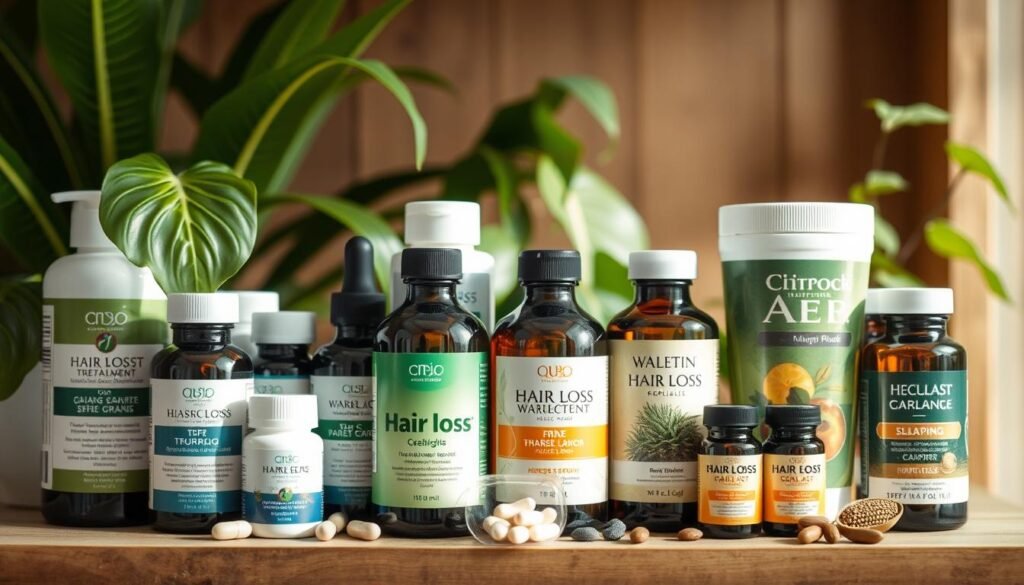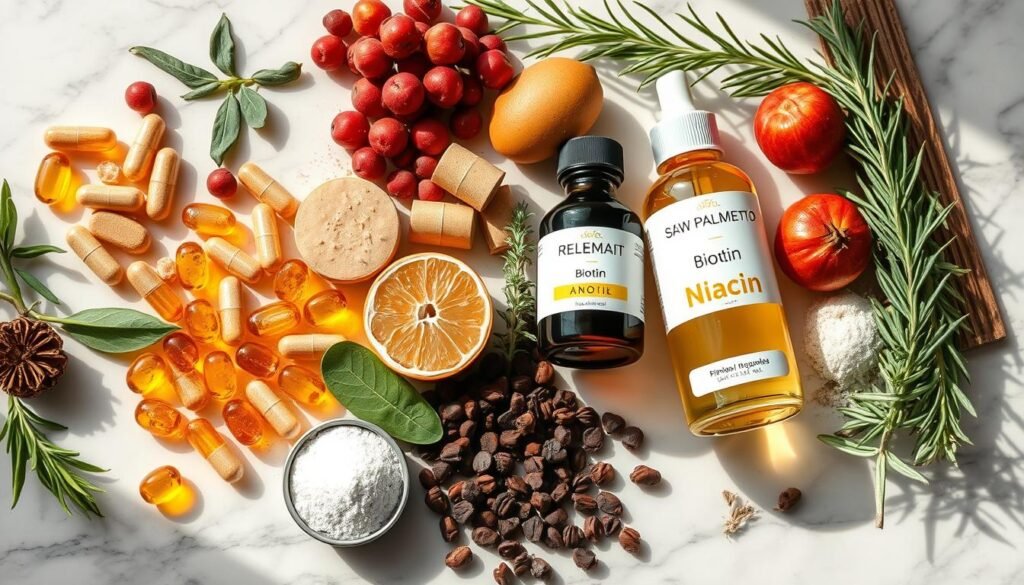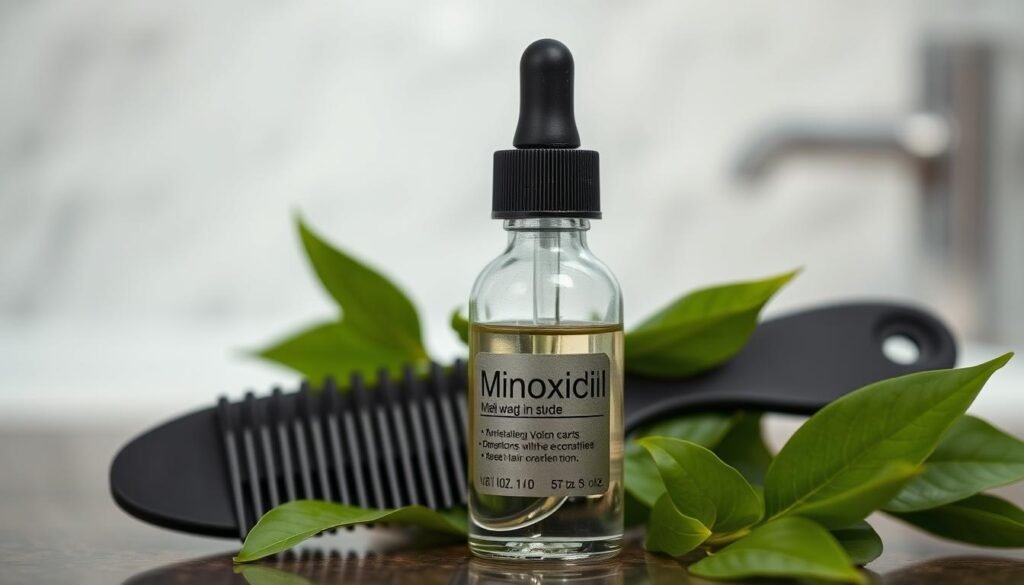Almost half of all men face androgenic alopecia, or male pattern baldness, by 50. This shows how common hair loss is. Luckily, there are easily available treatments like minoxidil for those wanting to fight back against hair thinning. Minoxidil is special because it’s the only hair loss medicine for both men and women approved by the FDA.
People often choose these treatments to stop more hair from falling out or to regrow lost hair. In this section, we’ll dive into the most effective, non-prescription hair loss treatments out there. We’ll detail their ingredients and action, helping those affected regain their confidence.
Key Takeaways
- Over 30-50% of men experience hair loss by age 50.
- Minoxidil is the FDA-approved over-the-counter treatment for hair loss.
- The majority of users find effective over-the-counter hair loss products beneficial.
- Early intervention with treatment can improve results significantly.
- This section explores the best over-the-counter hair loss treatment options available.
Understanding Hair Loss: Causes and Types
About 50 million men and 30 million women in the U.S. face hair loss. The reasons behind it vary greatly, from genetics and hormones to stress and certain health issues. Knowing why it happens is key to finding the best treatment and knowing what to expect.
Androgenetic alopecia, or pattern baldness, is a common type. It can start in the teen years for men, often as a receding hairline. For women, it usually shows as thinning hair on the top of the head during their 40s. Alopecia areata leads to patchy hair loss, with about 90% seeing hair return in a few years.
Telogen effluvium is hair thinning from stress, sickness, or after having a baby. It usually gets better. Scarring alopecias cause permanent loss due to skin problems. Issues like thyroid disease, lupus, and lacking vitamins can also lead to hair thinning.
An adult’s head has about 100,000 to 150,000 hairs, and losing up to 100 hairs a day is normal. Usually, 90% of scalp hair is growing, which can last from 2 to 8 years. Understanding hair loss types and causes is essential for choosing treatment, especially over-the-counter options.
| Type of Hair Loss | Description | Regrowth Probability |
|---|---|---|
| Androgenetic Alopecia | Pattern baldness due to genetics affecting men and women. | Variable |
| Alopecia Areata | Patchy hair loss, often regrows naturally. | 90% may regrow within a few years |
| Telogen Effluvium | Temporary hair thinning from stress or illness. | Often resolves with time |
| Scarring Alopecias | Permanent hair loss due to inflammatory conditions. | Not applicable |
| Involutional Alopecia | Gradual thinning due to aging. | Progressive |
What Are Over-the-Counter Hair Loss Treatments?
Over-the-counter hair loss products are easy to get and help those with thinning hair. You don’t need a prescription to buy them. This makes finding the right treatment straightforward and quick.
Topical solutions like lotions, serums, and shampoos are popular choices. They aim to boost hair growth and lessen hair shedding. Minoxidil is a standout, being the only FDA-approved over-the-counter option for androgenetic alopecia.
About 30% of men will see some hair loss by the time they’re 30. This increases to 50% by age 50. By 70, 80% of men will experience hair loss due to androgenetic alopecia. Women are also affected, with up to 13% of premenopausal women experiencing hair thinning. By 70, between 40% and 50% of women will notice hair loss.
People like nonprescription hair loss treatments for their simplicity. They can be picked up from store shelves without needing to see a doctor first. This lets individuals start working on hair restoration right away.

| Statistic | Age Range | Percentage Affected |
|---|---|---|
| Men with hair loss | 30 | 30% |
| Men with hair loss | 50 | 50% |
| Men with hair loss | 70 | 80% |
| Women with hair loss | 70 | 40% – 50% |
Popular Ingredients in Over-the-Counter Hair Loss Products
Many over-the-counter hair loss treatments have key ingredients that help with hair health and growth. Knowing what these ingredients are helps people pick the right products for them.
Minoxidil is one of the top ingredients, used in Rogaine®. It’s approved by the FDA and is the only topical product proven to fight androgenetic alopecia. It works by stimulating the hair follicles to grow.
Other notable ingredients include:
- Biotin: This is vital for hair growth. A lack of biotin can make hair thin.
- Zinc: Zinc is important for hair growth and repair. It keeps the hair’s oil glands working well.
- Collagen: A protein that supports hair health, making it strong and flexible.
- Azelaic Acid: Known for reducing inflammation, it may also decrease hair loss and encourage new growth.
- Tea Tree Oil: This oil helps keep the scalp clean by fighting fungus and bacteria.
When looking for hair loss products, choose ones with these scientifically supported ingredients. They have been proven to work effectively in promoting healthy hair.
| Ingredient | Function | Sources |
|---|---|---|
| Minoxidil | Stimulates hair growth | Rogaine® |
| Biotin | Supports hair health | Supplements, Eggs, Nuts |
| Zinc | Repairs hair tissue | Meats, Nuts, Seeds |
| Collagen | Enhances hair structure | Bone Broth, Fish, Eggs |
| Azelaic Acid | Reduces inflammation | Skincare products |
| Tea Tree Oil | Keeps scalp healthy | Essential oil products |

Minoxidil: The Most Common Over-the-Counter Hair Loss Treatment
Minoxidil is a top choice for fighting hair loss. It boosts hair growth for adults facing certain baldness types. It’s applied directly to the scalp to improve blood flow and prolong hair’s growth phase. Knowing how it works helps manage expectations effectively.
How Minoxidil Works
Minoxidil increases blood, oxygen, and nutrients to hair follicles, supporting healthier hair. Initial results may take a few months to show. If you stop using it, hair loss might return in a few months. More can be learned here.
Forms of Minoxidil: Liquid, Foam, and Shampoo
Minoxidil is available in different forms like solutions, foams, and shampoos. The most used methods are:
| Formulation | Dosage | Notes |
|---|---|---|
| Topical Solution | 1 mL to the scalp twice daily | Don’t use shampoo for 4 hours after application |
| Topical Foam | Half a capful to the scalp twice daily | Less irritating, absorbs better due to body heat |
Each type offers distinct benefits. Some prefer the foam, while others choose the liquid. Yet, regular use is key for results.

Those thinking about minoxidil should know its side effects. These can include skin issues and changes in hair. Talking with a healthcare provider is wise to ensure it suits your health needs.
Best Over-the-Counter Hair Loss Treatments: Our Top Picks
Finding the best hair loss treatments involves looking at what really works. Researchers tested 20 formulas for 12 weeks. They picked 13 top products based on their findings and user feedback. These selections stand out in the market today.
Advanced Trichology NutraM DHT Blocking Hair Serum
Advanced Trichology’s NutraM serum fights hair loss by blocking DHT. It also feeds the scalp and promotes hair growth. People saw more hair and better looks in just eight weeks. Use it twice daily for the best results.
Keeps 5% Minoxidil Foam
Keeps 5% Minoxidil Foam is a go-to for thinning hair. Only one pump needed, it’s simple to use. In three months, many notice less hair fall, some in just three weeks. For effectiveness, apply it twice a day.
| Product | Active Ingredient | Application Frequency | Time to Results |
|---|---|---|---|
| Advanced Trichology NutraM DHT Blocking Hair Serum | DHT Blockers | Twice daily | Approximately 8 weeks |
| Keeps 5% Minoxidil Foam | Minoxidil | Twice daily | Approximately 3 months |
These products are top picks for hair loss treatment you can buy over the counter. They have special qualities and benefits for people with hair loss. For more options and reviews, check out this resource.
Natural Over-the-Counter Hair Loss Treatments
There are many effective, natural remedies for hair loss. These treatments are perfect for those who prefer a holistic approach. Herbal ingredients and essential oils are especially popular for helping hair grow.
Herbal Ingredients and Remedies
Saw palmetto and red ginseng are great for hair growth. Saw palmetto may prevent hair loss by blocking DHT. Red ginseng can help hair start growing by activating hair follicles.
Onion juice is also good because it has lots of sulfur, which helps hair grow. Coconut oil is another option that’s safe, though we need more proof of how well it works.
Essential Oils for Hair Growth
Essential oils are a natural alternative too. Rosemary oil could work as well as minoxidil in making hair grow. Peppermint oil improves blood flow to the scalp, which might make for healthier hair roots.
Using these oils in scalp massages can also improve scalp health and make hair thicker. People looking into natural hair loss methods might find the right solution for them.
Affordable Over-the-Counter Hair Loss Solutions
Many people look for hair loss treatments that are friendly to their wallets. There are products that can help men and women regrow their hair without spending too much. You can find various options in the market that fit different budgets.
Finding Budget-Friendly Options
The price of hair loss treatments is a big concern for many. But, good treatments don’t have to be expensive. For example, the minoxidil foam from companies like Keeps and Rogaine has great results. Prices vary from about $15 to $134 per month, depending on the brand you choose.
Some hair loss products don’t cost much but work well. Take the Advanced Trichology NutraM DHT Blocking Hair Serum, for instance. At roughly $16, it shows real hair growth in three months. People like its low cost and high effectiveness. To explore more, you can visit this link.
Cost Comparison of Various Treatments
A table helps users compare the cost and expected results of popular hair loss remedies:
| Treatment | Price Per Month | Expected Results Timeline |
|---|---|---|
| Rogaine Foam | $45 | Visible results in 6 weeks |
| Keeps 5% Minoxidil Foam | $15 | Results in 1-2 months |
| Advanced Trichology Serum | $16 | Notable improvement in 3 months |
| Keranique Minoxidil | $40 | Results in about 8 weeks |
This comparison shows you don’t need to spend a lot for good results. When choosing a treatment, consider both the cost and how fast you’ll see results. For extra info on hair growth and over-the-counter remedies, see this resource.
Evaluating the Effectiveness of Over-the-Counter Hair Loss Treatments
It’s crucial to know how well hair loss treatments work for those trying to find a solution. People often ask how long it will take to see results and what signs show improvement. Treatments like minoxidil need months to show a big change. We will look at how long you should expect to wait and what signs of hair growth to look for.
Understanding Treatment Timelines
Being patient is essential with hair loss treatments you can get without a prescription. Changes might show up from three to six months after starting. Minoxidil users, for instance, saw noticeable improvements:
| Time Frame | Treatment Group (Mean Terminal Hairs) | Placebo Group (Mean Terminal Hairs) |
|---|---|---|
| Baseline | 271.0 | 256.0 |
| After 90 Days | 571.0 | 245.0 |
| After 180 Days | 609.6 | 242.2 |
For those using the treatment, the increase in hair count was significantly high (p
Signs of Improvement to Look For
To judge if a treatment works, look for certain improvements. Key signs are:
- Less hair falling out.
- New, soft hair strands appearing, or “peach fuzz.”
- More hair volume and thickness.
- Better coverage over the scalp.
After 90 days of use, over half of the study participants noticed these improvements. Watching for these signs can help confirm your treatment choice is effective.
Conclusion
Many options exist for people with hair thinning. This includes topical solutions like minoxidil and oral medications like finasteride. Natural remedies such as saw palmetto are also beneficial. Additionally, new treatments like Low Level Laser Therapy and Platelet-Rich Plasma therapy show promising results.
For effective hair loss management, consistency and patience are key. Most treatments take months to show results. This highlights the need for a strong commitment. Exploring both conventional and natural methods can also help take charge of hair health.
This article shows there are many ways to tackle hair loss. Choosing between FDA-approved treatments or natural remedies can be easier with the right knowledge. It helps people feel confident as they work towards better hair growth and wellness.